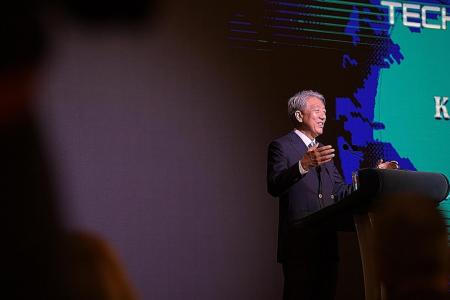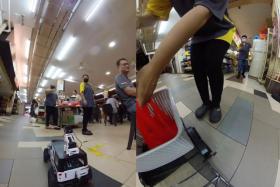S’pore inks deals with Britain, aviation firms to boost air force
A stronger air force, better counter-terrorism measures and more efficient logistics management are in the works through several pacts Singapore inked with Britain and two aviation companies at the inaugural Singapore Defence Technology Summit here.
At the three-day event where Deputy Prime Minister Teo Chee Hean gave the keynote address yesterday, companies showcased high-tech wares, such as the facial recognition technology that can spot car licence plates, recognise faces and identify colours on clothes by Chinese artificial intelligence company SenseTime.
Other technologies on display included patent analytics and motion sensors and a state-of-the-art fleet management system that the Republic of Singapore Navy will be introducing in phases by year end.
The Defence Science and Technology Agency (DSTA) and the Ministry of Defence (Mindef) said yesterday they had inked three memorandums of understanding during the event, which ends today.
DSTA will work with Boeing to use data analytics and develop a system that identifies performance trends and insights for the Republic of Singapore Air Force's (RSAF) F-15 and AH-64 aircraft. The agency will also work with Airbus to hatch technologies that better support RSAF aircraft.
On Wednesday, Mindef renewed a memorandum with its British counterpart to continue working to research, develop and test defence technologies.
They will also explore deeper collaboration in logistics management, maritime autonomy and counter-terrorism.
In his address, Mr Teo urged the delegates to work together and develop security solutions for threats that can grow as quickly as technology.
The summit is a platform to develop partnerships that defend against new technological attacks, he added.
"The more interconnected we are, and the more we rely on key nodes and critical information infrastructure, the higher the concentration risks," said Mr Teo, who is Coordinating Minister for National Security.
He suggested establishing new codes of practice and norms for technologies that are becoming ready for deployment but without international standards, such as autonomous vehicles that are currently being tested in Changi.
Get The New Paper on your phone with the free TNP app. Download from the Apple App Store or Google Play Store now



